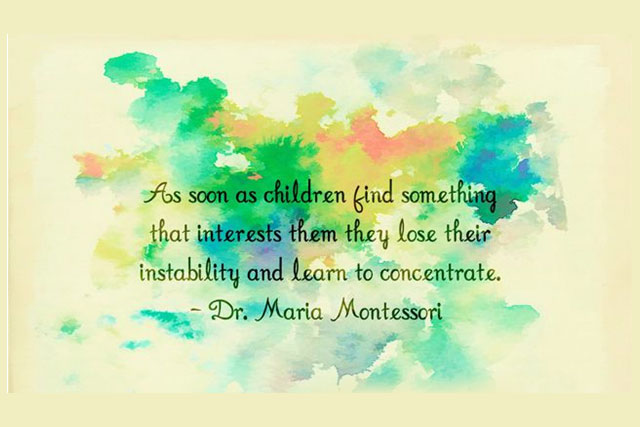
Montessori is a method of education devised by Dr Maria Montessori based on her extensive work with children. The physical and psychological urges expressed by the children that were observed by Dr Maria Montessori, led her to discover the world of children. The inherent potential and powers of the children that Dr Maria Montessori inferred motivated her to devise materials that would feed the hungry young minds.
Montessori Method of education enables holistic development that is body, mind and character as it allows children to learn through exploration based on their inner needs.
Though term “Montessori School” has been decoratively used by many, a visit to the school added with basic knowledge of Montessori Method of education would enable parents to identify the real ones.
Children consciously choose activities that allow them to learn and practice abilities and skills that they see adults carry out around them. The need for adaptation motivates the child to become independent. Also the child longs to make a valuable contribution to their community as we all are driven by a need to be needed. The need to learn is innate in all children. It leads them to attentive observation, exact imitation and eventually towards independent activity. An environment that meets this need is, according to Maria Montessori, the so-called “prepared environment”. The prepared environment functions on the principle “help me to do it by myself.”
The prepared environment comprises a variety of areas: practical life activities, sensorial material, language, mathematics, biology, geography and scientific experiments.
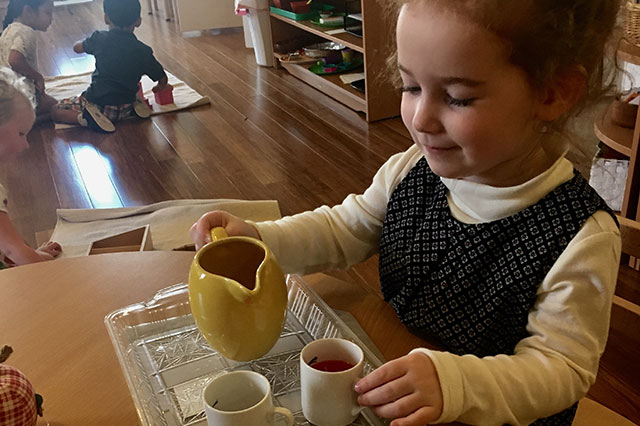 Practical life activities give opportunities to work with day to day life activities such as pouring water, washing, plaiting, cutting and so on. Through these activities, a child satisfies the need for movement of body in accordance with his\her mind. These activities aid children to act more independently as well helps them to develop will power and concentration.
Practical life activities give opportunities to work with day to day life activities such as pouring water, washing, plaiting, cutting and so on. Through these activities, a child satisfies the need for movement of body in accordance with his\her mind. These activities aid children to act more independently as well helps them to develop will power and concentration.
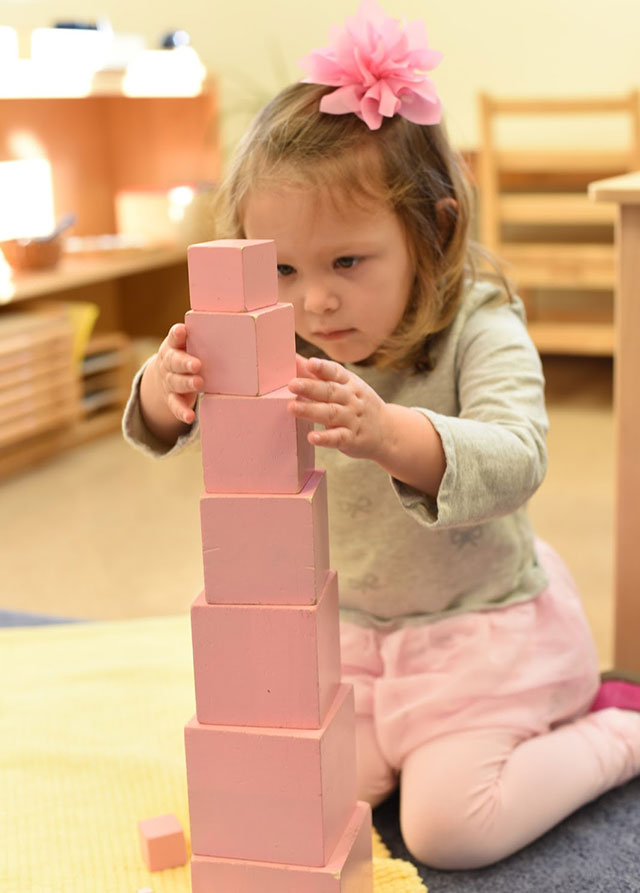 The sensorial material contains the keys to the world. They make a single quality perceptible. Children become acquainted with the qualities of objects in a concrete way through hands-on experience and learn to name these qualities (for example colour, shape, smell, taste, texture). Afterwards, they can “abstract” this knowledge and apply it in the environment (from concrete to abstract). For example, they learn to differentiate and name colours by using material named colour tablets. First, they pair the same colours, then acquire the names of the colours and finally apply these names in the environment like “grass is green, sky is blue.”
The sensorial material contains the keys to the world. They make a single quality perceptible. Children become acquainted with the qualities of objects in a concrete way through hands-on experience and learn to name these qualities (for example colour, shape, smell, taste, texture). Afterwards, they can “abstract” this knowledge and apply it in the environment (from concrete to abstract). For example, they learn to differentiate and name colours by using material named colour tablets. First, they pair the same colours, then acquire the names of the colours and finally apply these names in the environment like “grass is green, sky is blue.”
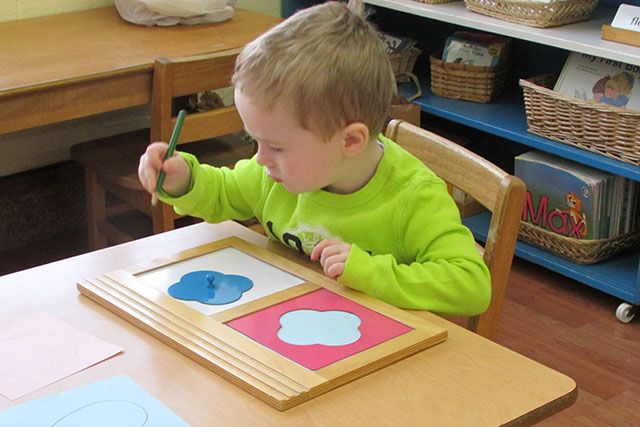 Language plays a key role and permeates all aspects of the Montessori Method. The children enlarge their vocabulary, develop their ability to communicate and acquire the basics in writing and reading as well as in grammar. Being with other children, with their teachers and carrying out the activities offered, children enhance their language skills. The sensorial material in particular helps children to acquire the exact terms for abstract concepts and to learn to use them. In addition, the “sound games” and the “sandpaper letters” open the world of writing and reading to children and allows for the first insights into the structure of language.
Language plays a key role and permeates all aspects of the Montessori Method. The children enlarge their vocabulary, develop their ability to communicate and acquire the basics in writing and reading as well as in grammar. Being with other children, with their teachers and carrying out the activities offered, children enhance their language skills. The sensorial material in particular helps children to acquire the exact terms for abstract concepts and to learn to use them. In addition, the “sound games” and the “sandpaper letters” open the world of writing and reading to children and allows for the first insights into the structure of language.
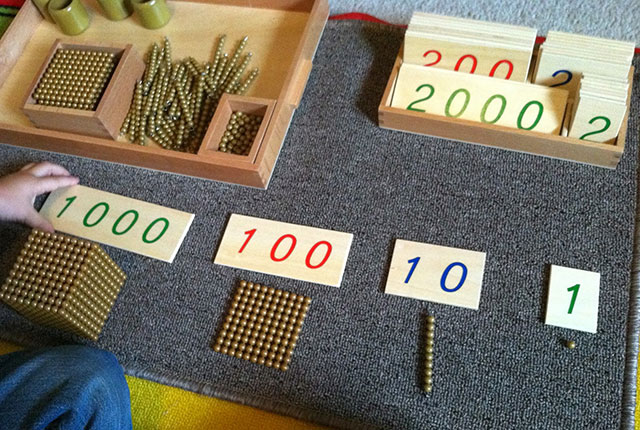 The Montessori mathematics materials allow children to develop a concept of number up to a million by means of working with concrete quantities. This knowledge is then extended in a playful and hands-on way through the four basic arithmetic operations (addition, subtraction, multiplication and division). Children at very early age do work in geometry and algebra at a sensorial level, experiencing the joy of discovery when gaining new insights.
The Montessori mathematics materials allow children to develop a concept of number up to a million by means of working with concrete quantities. This knowledge is then extended in a playful and hands-on way through the four basic arithmetic operations (addition, subtraction, multiplication and division). Children at very early age do work in geometry and algebra at a sensorial level, experiencing the joy of discovery when gaining new insights.
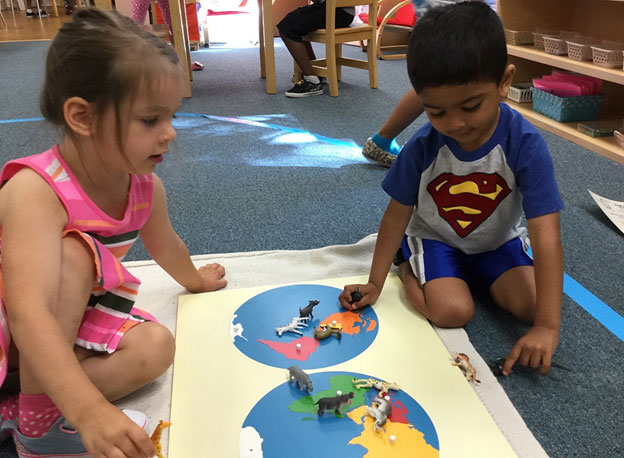 Subjects such as biology or geography are also presented to children at a sensorial level so that they may experience and understand abstract concepts in a concrete manner.
Subjects such as biology or geography are also presented to children at a sensorial level so that they may experience and understand abstract concepts in a concrete manner.
Afterwards, the children apply the acquired knowledge in their environment.
By means of simple scientific experiments, the children have the opportunity to observe and describe a number of phenomena.
Children experience music in different ways. They sing, dance and refine their sense of hearing. They sing together with other children, practice new songs and perform them.
Art is an integral part of education. There are a number of activities offered so that the children can engage in artistic work.
Children are introduced to the work of various artists and to a variety of art movements with carefully selected materials.
Children learn by watching and then doing for themselves. Children are allowed to do what they can do for themselves. Activities are selected by child from the shelves and returned upon finishing Montessori materials are designed to develop specific skills. Each child is encouraged to progress at his or her own level of readiness.
8939218833
8695945222
© All rights reserved.